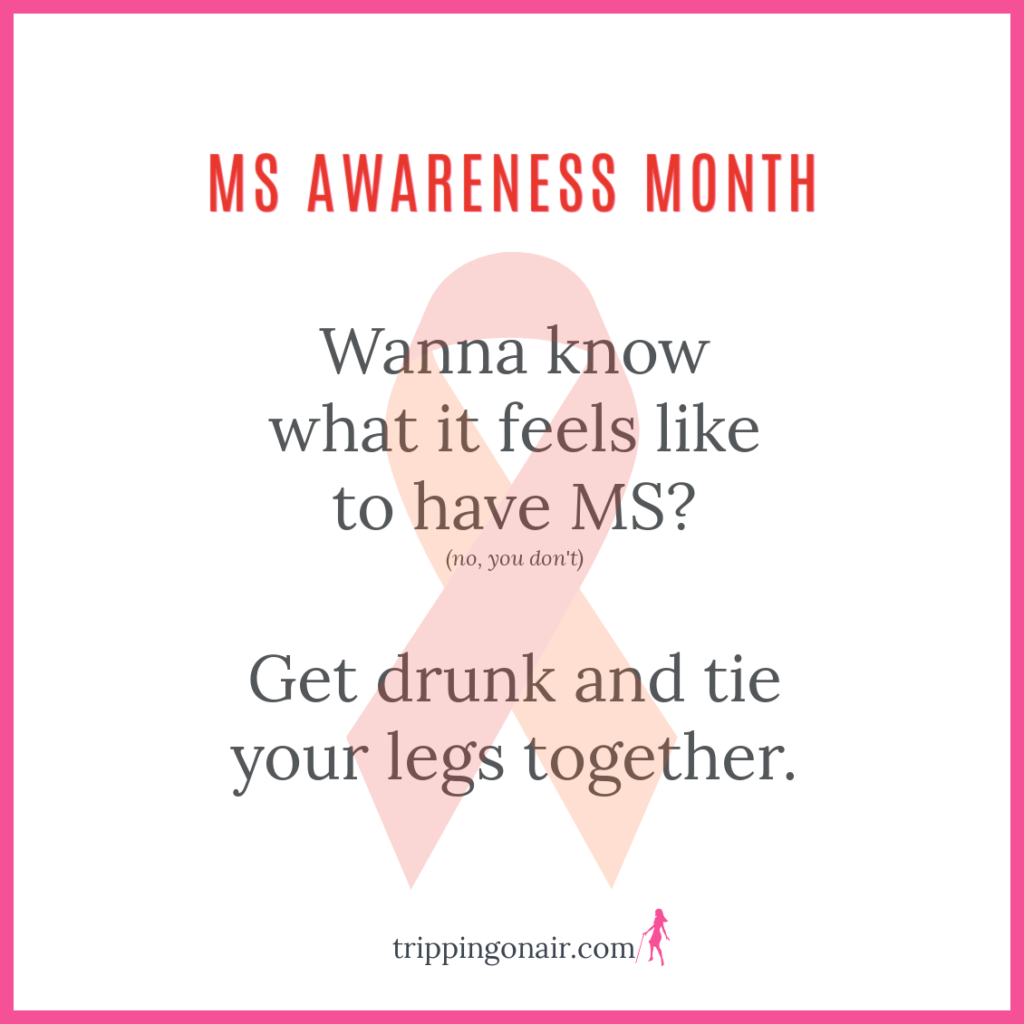Mobility Aids 101: How To Cope, What To Get

Welcome to March, Trippers. It’s MS Awareness Month (at least in the US, so basically, everywhere), and I have mixed feelings. I’m all for advocacy, but advocacy on my own terms. People with MS are forced to raise awareness, all day, every day, whether we want to or not. Anyone who’s ever had to explain invisible symptoms, ask for accommodations, or been subjected to questions like, “why are you using a mobility aid?” is constantly having to educate the world about MS. And it’s exhausting.
If you’re feeling the awareness campaign drain, my advice to you is to put down your phone, buy yourself a present, and pour yourself a drink. MS is already living rent-free and you shouldn’t feel compelled to use what’s left of your precious energy to ask for donations or to teach anyone anything about MS if you’re not into it. By the power invested in me by the interwebs, I hereby grant you permission to make MS Awareness Month for you!

Now, let’s talk mobility aids
It’s possible that we’re too burnt out to educate others because of how much energy we have to spend educating ourselves. The world of mobility aids can be confusing and even overwhelming. I’ve written about mobility aids before, so I’m dropping some archives into this post in case you’re new to the scene and want to do a deep dive. When it comes to mobility aids, a lot of what I’ve learned is practical, nuts and bolts stuff, but the most important lessons I’ve learned (and am still learning), are the psychological ones. MS is a mind-fuck.
On the pod: mobility aids 101
From cool canes, to sporty trekking poles, to rollators that are literally transformative, mobility aids make life better…eventually. The transition to progressive MS is hard, and freaking out is a reasonable reaction. Grieve. And when you’re ready, tune in to this month’s episode for tips on how to find the right mobility aids that will work for you.
#babesWithMobilityAids
I wasn’t born with any chill about mobility aids. Can a glow-up help you deal with MS progression the way it helped me?
Cool rollators
If you’re ready for a rollator, a cool rollator can help you feel better about the shitty fact that you need one. Check out my comparison of the Rollz and byAcre here.
What did you just say?
And finally, Alex and I talked on the pod about the concept of different aids for different days. If I’d understood that part-time mobility aid use was a thing it might have eased my anxiety back when I began to need them. Instead, I’d been fed the line that ‘not everyone with MS ends up in a wheelchair’. Cross your fingers and hope for the best did nothing to calm my fear. ‘Not everyone ends up in a wheelchair’ is a toxic mantra that reinforces what society wants us to believe about disability–that it’s a fate worse than death. Check out my full rant here.
Got any mobility aid questions, comments, or concerns? Drop me a line or tag me in your #babesWithMobilityAids photos because it’s way easier to rock a mobility aid when you know you’re not alone.

Follow Tripping On Air on Facebook, Insta, YouTube.


 Back to
Back to
Ten years passed from when MS was first mentioned to me and the time of diagnosis. Eight years after diagnosis, I “gave in” and started using a cane. Every hard, negative thought crossed my mind. Mainly, ideas of what my husband and kids would think were most pressing. Three and a half years into using my cane, I started using a rollator inside our home. I have a walker outside every door should I want to navigate the outdoors. I, too, noticed previously how pushing a shopping cart made shopping easier. Walking is definitely the biggest Achilles heel. Long story short, after a fall is when I decided to use a cane. No way do I want to cause additional damage in which could be permanent. Walking with an awkward or unnatural gait will I eventually cause issues with hip and or back as well as other issues. Learning this the hard way, I have “given in” to using a wheelchair while in most public areas. This avoids the chance of being knocked over (due to poor balance) by someone that could bump into me. Walking in my new normal way (weird gait) also uses a ton of energy. Energy that I’d rather reserve for more fun opportunities. Preserving energy and staying upright and preventing further issues is my top priority. When I remind myself of that, the stigmatism of using mobility aids instantly vanishes. Advice for MS and mobility aids has been rare, even from medical professionals. I have learned to be my own advocate which is power perhaps some don’t think about.
I have a super amazing service dog to help me get around. He pull starts me and gets people to give me space.
How did manage to get a service dog? I looked into it but the price put it way out of my range.
I have been using a cane for over 25 years, way before I was diagnosed with MS. After a few falls-and a few cracked ribs-I thought a rollator was the wisest idea. I couldn’t believe how mush faster I could walk with less energy. I have recently ordered a wheelchair in fuschia and will likely rock it in the great outdoors while I stick to the rollators at home and at work. I have found that most people are quite accommodating when you use mobility aids (aka energy savers, freedom machines). The others need more education..from someone else. I’m busy rolling down the trails!
You have been doing your blog for a long time. I’ve had ms for 36 years and you have a lots f great great job!
I am a 2 crutch MS’er myself. I live in hilly Seattle so rollator is not always the best option for me. Rolling, hills, a bit dicey. I was intrigued about part of the conversation regarding a rollator to transport chair to rider powered unit. I will be keeping my eye out for this kind of device. It would be great to have 1 unit where I could walk or ride self propelled with electric motor. This could be so practical in so many ways, and what independence. especially if I could pop it in my car and go. Walking, riding, resting, as needed. Nivana!
Went from falling, able to get up on my own, using a cane and then to a walker. Now can’t stand and stuck using a crane to go to a wheelchair and back in a hospital bed. Forget about the bathroom, does anyone know where this magical room is anyway? Indeed a strenuous battle daily, my hope is to stand one day, of course according to medical experts I’ll never stand or walk again. I’m no expert so I’ll keep trying.
You’re a really good writer. The last few lines are heartbreaking.
Wendy
My speed and gait got too sloppy and slow to use my Byacre rollator in situations where walking long distances is exhausting; hospitals, grocery stores, parks, museums and the like. I got a small battery operated scooter called the Travelscoot. It’s been liberating to go to my medical appointments alone. The medical staff have to talk to me, not whoever is pushing me, for one. If I have a companion to push the shopping cart, going to the grocery store is great too. Rollator is still the main thing around the house and going from the car to the restaurant, but this little electric scooter has kept me out there,at least for now….
Thank you for sharing this experience. I feel like some of my longest walks are at the hospital. Like, why is the MRI SO FAR! A scooter is an awesome idea, and I love your point about ppl having to speak directly to you. Great tips all around.
Diagnosed with PPMS in 2017. Started aquiring walkers shortly there after (bought a lot at thrift stores). I have them conveniently scattered around house and office so readily available when needed.
Bought a zinger chair (https://www.shopjourney.com/products/zinger-electric-mobility-chair) for business travel in 2018. Works great getting through airports, around malls and for any trip needing speed and distance. MS has continued to progress to the point where I always need a walker and I rarely leave my vehicle without my Zinger chair.
Recently have came to the conclusion that walking at home even with walker is sometimes to challenging (especially when battling COVID). So I have acquired an additional chair (https://quicknmobile.com/product/eagle-falcon-power-reclinable-folding-wheelchair/) for my home. Not the easiest to maneuver but I am getting better at it. My wife is exasperated with me running into walls. Need to make home modifications (wider doors and hardwood).
Bought a Notawheelchair (https://notawheelchair.com/products/the-rig) in 2018 for outdoor adventures. I love to get on it and just go.
I am bound and determined to maintain a degree of independence.
Adapt and keep going.
livingmybestwithms
Thanks for sharing all of your gear! MS certainly comes with accessories. Keep moving!
I’m surprised no one has mentioned the Bioness L300 for foot drop. I’ve had mine for 14 years. Total game changer. Doesn’t work for everyone, but if what it does matches your deficit it’ll change your life. I have severe foot drop and barely any hip flexor on my left side. The FES cuff replaces the missing signal in the tibial nerve. The pt syncs the electric signal with your gait. Voila, lifted foot. Expensive, $6000 ish, just for the bottom cuff and many insurances won’t cover it. A companion upper cuff can synchronize with a weak hamstring. ( thousands more) In the US you can get a free eval with their PT. Hangar makes a similar device, which is $4000 ish, but I’ve never tried theirs. I had MS for 8 years before I stumbled across it at a conference. I couldn’t believe it wasn’t a commonly known piece of gear.
I tried the Bioness but it wasn’t helpful for me. I think if I’d had access to it a couple of years earlier it would have been a game-changer. Too often we don’t get offered these interventions early enough – or at all. Presumably because they are so wildly out of price range for most.
Thanks for sharing your experience and I’m glad it’s working for you!
For airports and travel, I use the atto scooter…..super design, and so easy to fold up and down. It is the byacre of electric scooters. Gave me lots of independence when I can’t walk long distances. I don’t have MS but have autoimmune issues that have caused my legs to be numb which makes walking really hard. I just ordered the byacre rollator as well.
Thanks for sharing! I am going to google this scooter asap.